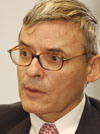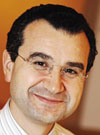A little known fact: there is a higher level of foreign ownership of top French companies than of either US or UK large companies.
The French state still owns €170bn in assets of traded French companies; it has also proved unwilling to relinquish ownership in some industries and keen to protect French ownership of others. However, according to the publicly available listings from Thomson Financial, at least 25.1% of CAC 40 assets are owned by foreign companies and investors. This compares with only 6.9% of the top 40 companies by market capitalisation in the S&P 500 and 22.2% of the top 40 companies in the FTSE 100, touted as two of the most international markets in the world.
This fact may be surprising. From the endless discussion about the merits or shortcomings of France’s deep tradition of state involvement in the economy, its obvious suspicion of Anglo-Saxon capitalism and the furore surrounding the government’s intervention in sensitive industries – such as to prevent a foreign takeover of Gaz de France, for example – the shareholdings of France’s top companies might have been expected to have a more domestic flavour.
Open markets
“The perception of ‘Fortress France’ protected by government intervention is simply not matched by the facts,” says François Kayat, head of global corporate finance at Calyon. “Through the country’s takeover rules, France has created the legal framework for one of the most open markets in continental Europe. This is clearly demonstrated by the level of foreign ownership of CAC 40 companies.”
One banker cited as examples AGF, the second-largest insurance company in France, which is owned by German insurer Allianz; Euronext, which recently merged with the New York Stock Exchange; and Arcelor, which was taken over by Mittal. Is this really a picture of Fortress France, he asked. “The image of protectionist France is misguided. It is true that there is government interest in some of the more sensitive industries, but the same can be said for many countries,” says Thierry Varenne, global head of corporate finance at BNP Paribas.
Bankers also argue that France is an increasingly competitive banking market. While French banks s, till dominate French league tables, the notion that a system of French favouritism operates in the corporate/banking relationship is an outmoded view of how Frances does business, says Mr Kayat.
“The idea that French companies automatically choose a French bank to represent them was fatally undermined when the Axa-Union des Assurances de Paris merger was announced as long ago as 1996. It was the first domestic deal in which the companies were advised by US banks; foreign banks are now regularly present in French deals,” he says.
|
| “The world has changed, and it is a myth to believe that France is an exception,” says Bertrand Duval, global head of client coverage at Natixis. “What would have been considered taboo until only five years ago is now accepted practice. Where once hostile deals were unthinkable, just like everywhere else they are now a feature of everyday business life in France.” |
Foreigner assistance
As a further demonstration of what many would see as Anglo-Saxon-style corporate relationships, some bankers cite the recent hostile takeover of Arcelor by Mittal, in which from the outset Société Générale (SG) undertook to represent Mittal.
Some argue that because Arcelor was represented by the other major French investment banks, SG was compelled to find a role somewhere in one of the defining corporate finance transactions of 2006; moreover, Mittal was an existing SG customer. Nonetheless, Mr Duval agrees that supporting a foreign company in the hostile takeover of a high-profile, quasi-domestic firm was a significant moment in French markets.
The potential impact on French markets of the new president Nicholas Sarkozy was a hot topic in the run up to the presidential elections, although final bets concerning which way his policy will swing will not be placed until after the parliamentary elections in mid-June.
Most bankers reason, however, that after the election, equity market activity, at least, will gather momentum.
|
| “The second half [of the year] will see more visible and sizeable transactions right across the equity markets. Corporates have naturally been waiting to see what the policy environment will be and how it could affect tax policies, before they finalise funding and other strategies,” says Michel Cohen, global head of equity capital markets at Société Générale Corporate & Investment Banking (SG CIB). |
In addition to the tricky task of liberalising the labour markets, Mr Sarkozy’s government has a busy agenda immediately ahead. And it has the markets buzzing.
Issues to be decided include finalising the future of Gaz de France – whose defensive merger with Suez was first mooted at the end of 2005 and which is still unconcluded – and whether or not to sell another tranche of Electricite de France (EdF). While French law still prevents the government holding falling below 70%, that leaves it with 15% to dispose of if it wishes. At current market value, that amounts to a about €17bn – a useful sum if Mr Sarkozy wishes to reduce French government debt, for example, which in March this year stood at about 64% of gross domestic product, according to Moody’s.
Nuclear option
There is also a lot of market chatter about whether or not the government will privatise nuclear power giant Areva (Siemens already owns 34% of subsidiary Areva NP, which specialises in the design and construction of nuclear power plants), which was blocked in 2005 by then-finance minister Thierry Breton as too “sensitive”. Mr Sarkozy is rumoured to favour a partial privatisation. According to market participants, construction conglomerate Bouygues has expressed an interest in acquiring the business, as has the new CEO of Total, Christophe de Margerie.
“Everyone is wondering if it will go to the open market or to strategic partners,” says one banker.
Perhaps top of Mr Sarkozy’s list is EADS, of which the French government owns 15%, and its subsidiary Airbus, which has been suffering from a falling dollar and delays that have wiped more than €5bn off its profit forecasts.
“I think Mr Sarkozy will probably move quickly: first, some of these decisions are reaching emergency levels, such as Airbus; and second, the government cannot leave large companies like Gaz de France and Areva with no idea of their future direction, particularly at a time of major industry consolidation,” says Natixis’ Mr Duval.
Many believe that how Mr Sarkozy handles EADS’ problems will be a key indication of his propensity for economic patriotism. And while bankers and other market participants universally applaud Mr Sarkozy’s more pro-free market credentials, few believe that he will entirely abandon interventionism if push comes to shove.
In 2003, as minister of the interior, Mr Sarkozy oversaw the rescue of French power and transport conglomerate Alstom. After the EU had blocked the French government’s original plan, saying that it amounted to illegal state aid, Mr Sarkozy arranged a €3.2bn bail-out in which banks and the government would buy some of the company’s debt, rather than become shareholders.
According to a source who was present, Mr Sarkozy hosted a meeting of bank representatives to “convince them to financially support the company until it was in better health”. When one of the bankers at the table stated that his firm was unwilling to put in any financial support, Mr Sarkozy coolly paused the meeting and led the banker out for a chat. Mr Sarkozy is said to have returned 15 minutes later, without the banker, but with his firm’s commitment.
“Alstom took only a matter of months to turn around and now has great operating margins. It showed Mr Sarkozy that political intervention can work very well. If he feels he has to do it again, he will,” says the source.
State track record
Whatever people’s feelings regarding the French interpretation of capitalism and free markets, many bankers defend the government’s performance in the past, saying that it has handled state industries and their disposals well. For example, the EdF share price has more than doubled since privatisation – rising from €32 at the end of 2005 to €69.9 now, currently valuing the company at more than €127bn. Mr Varenne says: “Analysis of past privatisations show that the government has historically created a great deal of value for the company and extracted great value for the tax payer.”TABLE: FOREIGN HOLDINGS IN GLOBAL STOCKMARKETS













